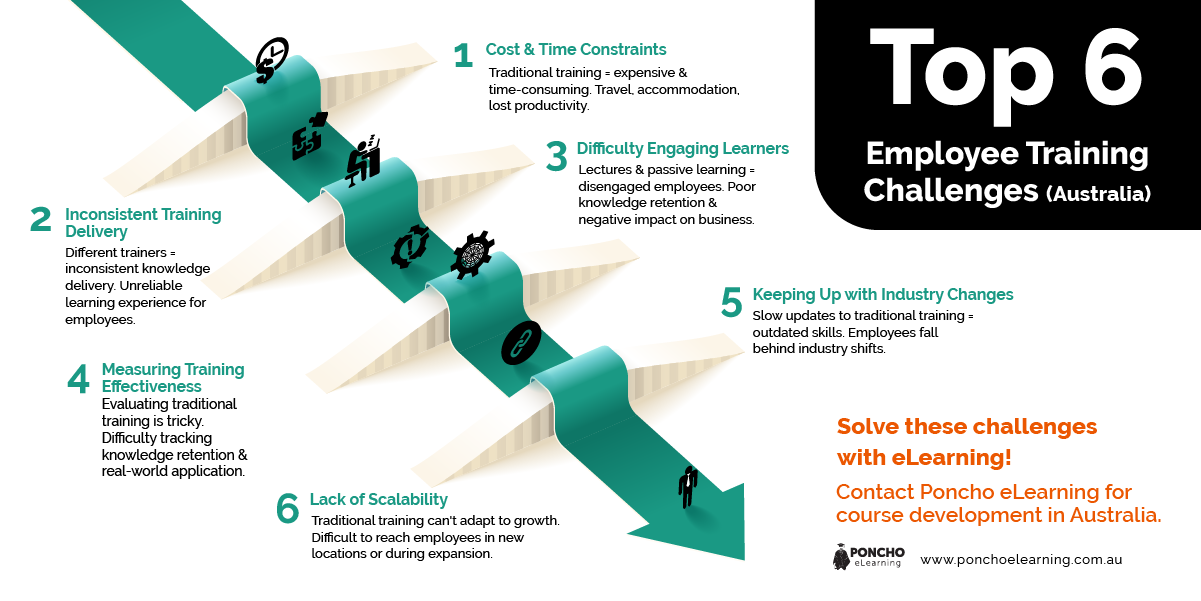Investing in effective course development in Australia, particularly through eLearning solutions, is crucial for Australian businesses in today’s dynamic landscape to keep their workforce skilled and up-to-date.
What are the 4 Stages of eLearning?
eLearning development typically follows a four-stage process: 1.) Needs Analysis: Identifying knowledge gaps and training goals. 2.) Design and Development: Creating engaging content and activities. 3.) Delivery and Implementation: Launching the eLearning course and supporting learners. 4.) Evaluation and Improvement: Assessing the effectiveness of the course and making adjustments.
Here, we’ll delve into the top 6 challenges Australian businesses face with employee training and explore how eLearning from Poncho eLearning can be a powerful solution.

Challenge #1: Cost and Time Constraints
Traditional training methods like in-person workshops can be a budget-buster and a time-suck. Bringing employees together from various locations across Australia for training involves travel costs, accommodation expenses, and lost productivity during their absence.
Developing and delivering traditional materials can also require significant investments in time and resources.
eLearning Solution:
eLearning offers a cost-effective and time-saving alternative. Online courses can be accessed anytime and anywhere, eliminating the need for travel and freeing up valuable employee and trainer time.
Course development in Australia, tailored to your specific needs, focuses on the most critical skills and knowledge. Additionally, eLearning platforms often have subscription models, allowing businesses to pay a fixed monthly fee for access to a library of courses.
Challenge #2: Inconsistent Training Delivery
Relying solely on in-person training can lead to inconsistencies in how information is delivered. Different trainers may have varying styles and levels of expertise, resulting in uneven learning experiences for your employees. This inconsistency can significantly impact the effectiveness of your training programs.
eLearning Solution:
eLearning ensures the consistent and standardised delivery of training content. Every employee, regardless of location, receives the same high-quality information presented in a clear and engaging way.
Poncho eLearning’s courses incorporate features like quizzes and assessments to ensure all learners grasp the material effectively.
Challenge #3: Difficulty Engaging Learners
Let’s be honest, traditional classroom-style training can be dull and uninspiring. Employees bombarded with long lectures and passive learning experiences are more likely to lose focus and forget key information.
This disengagement can lead to poor training outcomes and a negative impact on your business.
eLearning Solution:
eLearning offers a variety of engaging formats to keep learners motivated and interactive. Poncho eLearning incorporates gamification elements, simulations, video lessons, and bite-sized learning modules.
By incorporating multimedia elements and interactive activities, eLearning keeps learners engaged and fosters a more enjoyable learning experience.
Challenge #4: Difficulty Measuring Training Effectiveness
Evaluating the effectiveness of traditional training can be challenging. It can be difficult to track whether employees have retained information and translated it into real-world skills.
eLearning Solution:
Many eLearning platforms, including Poncho eLearning’s, offer built-in analytics and reporting tools that allow you to track employee progress, assess their understanding of the material, and identify areas where they might need additional support.
This data allows you to measure the effectiveness of your training programs and make data-driven decisions for improvement.
Challenge #5: Keeping Up with Industry Changes
The Australian business landscape is constantly evolving, and new skills are becoming essential across various industries.
Traditional training programs can often be slow to adapt to these changes, leaving employees with outdated knowledge and skills.
eLearning Solution:
eLearning content can be easily updated and revised to reflect the latest industry trends and regulations. This ensures your employees have access to the most current information and are equipped with the necessary skills to succeed in the ever-changing business environment.
With course development in Australia from Poncho eLearning, we leverage local expertise to tailor the content to the specific needs of the Australian workforce.
Challenge #6: Lack of Scalability
Traditional training programs can be difficult to scale as your business grows. Adding new employees or expanding to new locations can create logistical challenges for delivering consistent training.
eLearning Solution:
eLearning is inherently scalable. The eLearning course is always available for any employee, anywhere, anytime.
This makes eLearning a perfect solution for businesses with a geographically dispersed workforce or those experiencing rapid growth.
How Poncho eLearning Can Help
At Poncho eLearning, we understand the unique challenges faced by Australian businesses when it comes to employee training and development. Our team of experienced instructional designers and eLearning specialists are passionate about creating engaging and effective eLearning courses that address your specific needs.
We offer a comprehensive suite of services designed to help you overcome the challenges associated with traditional training and unlock the many benefits of eLearning.
Ready to Get Started with eLearning?
At Poncho eLearning, we’re committed to helping Australian businesses unlock the full potential of their workforce through engaging and effective eLearning solutions.
Contact us today for a free consultation to discuss your specific training needs and how we can help you achieve your learning and development goals.




